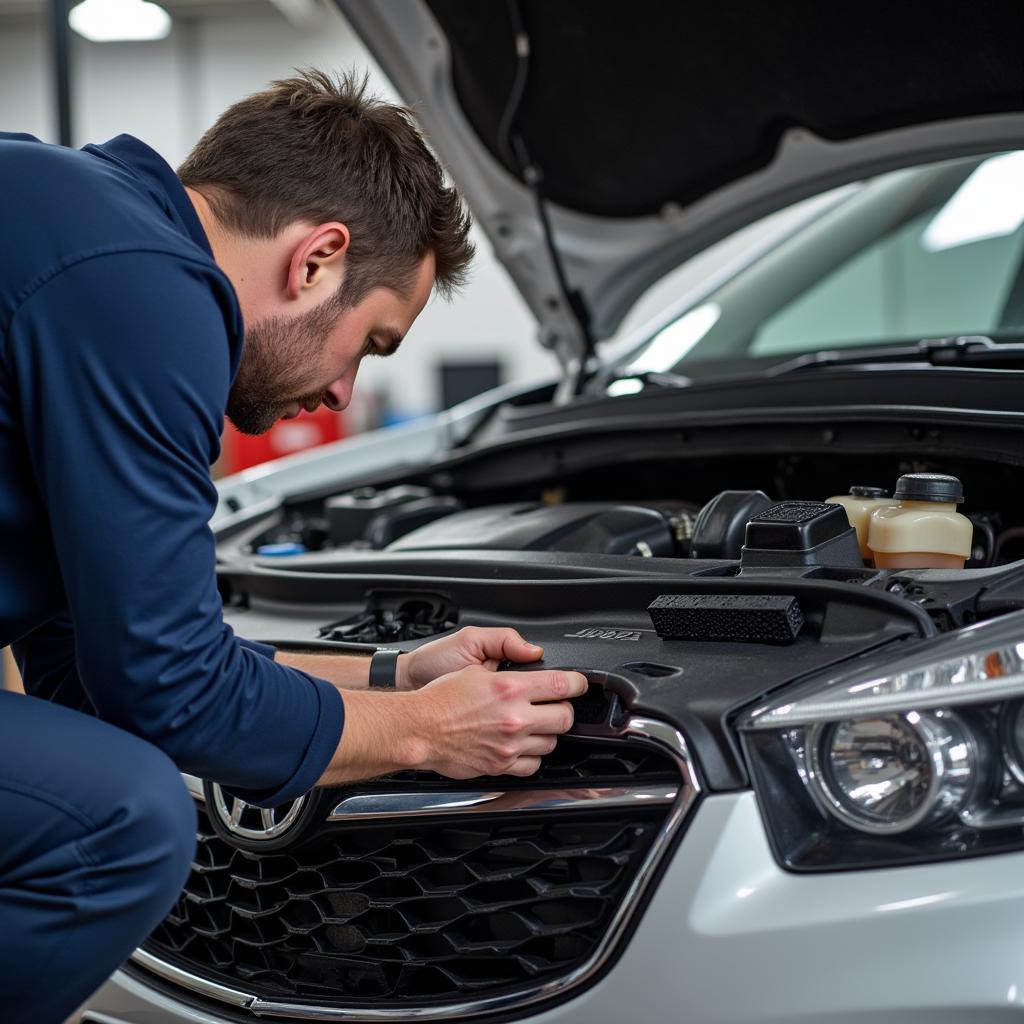A leaking or damaged radiator can quickly lead to overheating and serious engine problems. Understanding how much a car radiator repair cost is crucial for budgeting and making informed decisions. Several factors influence the final price, and we’ll explore them in detail to help you estimate the potential expenses.
Radiator repairs can range from simple fixes to complete replacements. Knowing the difference between a minor leak and a major failure can save you money. For instance, a small leak might be repairable with a sealant, while a severely damaged radiator will likely require a full replacement. Want to learn more about engine repairs? Check out our guide on how to repair car engine.
Factors Affecting Car Radiator Repair Cost
Several factors contribute to the overall cost of radiator repair. These include the type of vehicle, the extent of the damage, the labor costs in your area, and the choice between OEM and aftermarket parts.
Vehicle Type
The make and model of your vehicle play a significant role in the cost of the radiator itself. Luxury or imported vehicles often have more expensive parts. Similarly, older vehicles might require harder-to-find radiators, impacting the price.
Extent of the Damage
A minor leak might be patched for a relatively low cost. However, if the radiator has significant damage, such as cracks or corrosion, a replacement becomes necessary. The cost of replacement is considerably higher than patching. A complete radiator replacement also often involves flushing the cooling system and replacing the coolant, adding to the overall expense.
Labor Costs
Labor rates vary depending on your location and the specific mechanic. Independent shops might offer lower labor rates compared to dealerships. However, dealerships often specialize in your vehicle’s make and model and may provide more specialized expertise.
OEM vs. Aftermarket Parts
Original Equipment Manufacturer (OEM) parts are made by the vehicle manufacturer, while aftermarket parts are produced by third-party companies. OEM parts are typically more expensive but are guaranteed to fit and perform as intended. Aftermarket parts can be a more affordable option but might not always offer the same level of quality or longevity.
Common Radiator Repair Costs
Here’s a general overview of typical radiator repair costs:
- Minor Leak Repair: $50 – $150
- Radiator Hose Replacement: $100 – $300
- Radiator Fan Replacement: $200 – $500
- Radiator Replacement (Aftermarket): $200 – $400 (parts) + $200 – $400 (labor) = $400 – $800
- Radiator Replacement (OEM): $400 – $800 (parts) + $200 – $400 (labor) = $600 – $1200
These prices are estimates and can vary depending on your specific situation. It’s always best to get a quote from a qualified mechanic for an accurate assessment. You can learn more about car dent repair costs here: how much does car dent repair cost.
 Mechanic Inspecting Car Radiator
Mechanic Inspecting Car Radiator
Signs Your Radiator Needs Attention
Recognizing the early signs of radiator problems can help you avoid costly repairs down the line. Some common indicators include:
- Low Coolant Levels: Regularly check your coolant reservoir. Low coolant levels can indicate a leak.
- Overheating Engine: If your engine temperature gauge consistently reads high, it’s a sign of a potential radiator problem.
- Leaks Under Your Car: Puddles of coolant under your vehicle are a clear indication of a leak.
- Sweet Smell: A sweet, syrupy smell coming from your car can indicate a coolant leak.
If you notice any of these signs, it’s crucial to have your radiator inspected by a qualified mechanic as soon as possible. Ignoring these signs can lead to more severe and expensive engine damage. For instance, if your engine has locked up, you can find helpful information on how to repair engine locked car. Similarly, if you’re experiencing issues with your AC condenser, you can find information on can car ac condenser be repaired. Alternatively, if you are looking for guidance on fixing a radiator leak, you can check out how to repair car radiator leak.
Conclusion
Knowing how much a car radiator repair cost helps you prepare for potential expenses and make informed decisions. By understanding the factors that influence the cost and recognizing the signs of radiator problems, you can protect your engine and avoid costly repairs.
FAQ
- How often should I flush my radiator? Consult your vehicle’s owner’s manual for specific recommendations, but generally, every 2-5 years is a good guideline.
- Can I drive with a leaking radiator? No, it’s not recommended. Driving with a leaking radiator can cause your engine to overheat and lead to severe damage.
- How can I prevent radiator problems? Regularly checking your coolant levels and having your cooling system inspected by a mechanic can help prevent issues.
Need help with your car’s radiator? Contact us via WhatsApp: +1(641)206-8880, Email: [email protected]. Our customer service team is available 24/7.


